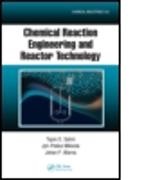Read more
Informationen zum Autor Tapio Salmi is a professor of chemical reaction engineering at Abo Akademi in Abo-Turku! Finland. Jyri-Pekka Mikkola is a professor of industrial chemistry at Umea University in Sweden and Abo Akademi in Abo-Turku! Finland. Johan P. Warnais a professor of chemical reaction engineering at Abo Akademi in Abo-Turku! Finland. Klappentext Offering a systematic! generalized approach to chemical reactors! this volume defines the quantitative aspects that affect the selection of an industrial chemical reactor and couples various reactor models to the case-specific kinetic expressions for various chemical processes. Special attention is given to the exact formulation and derivation of mass and energy balances and their numeric solutions. Richly illustrated! the book covers both theoretical reaction engineering aspects and practical issues of reactor technology. It explores homogeneous reactors along with more advanced heterogeneous systems. Realistic practical exercises and solutions are included in the text. Zusammenfassung The role of the chemical reactor is crucial for the industrial conversion of raw materials into products and numerous factors must be considered when selecting an appropriate and efficient chemical reactor. Chemical Reaction Engineering and Reactor Technology defines the qualitative aspects that affect the selection of an industrial chemical reactor and couples various reactor models to case-specific kinetic expressions for chemical processes.Offering a systematic development of the chemical reaction engineering concept! this volume explores:Essential stoichiometric! kinetic! and thermodynamic terms needed in the analysis of chemical reactorsHomogeneous and heterogeneous reactorsResidence time distributions and non-ideal flow conditions in industrial reactorsSolutions of algebraic and ordinary differential equation systemsGas- and liquid-phase diffusion coefficients and gas-film coefficientsCorrelations for gas-liquid systemsSolubilities of gases in liquidsGuidelines for laboratory reactors and the estimation of kinetic parametersThe authors pay special attention to the exact formulations and derivations of mass energy balances and their numerical solutions. Richly illustrated and containing exercises and solutions covering a number of processes! from oil refining to the development of specialty and fine chemicals! the text provides a clear understanding of chemical reactor analysis and design. Inhaltsverzeichnis IntroductionPreliminary StudiesLaboratory ExperimentsAnalysis of the Experimental ResultsSimulation of Reactor ModelsInstallation of a Pilot-Plant Unit Construction of the Facility in Full ScaleStoichiometry and KineticsStoichiometric MatrixReaction KineticsHomogeneous ReactorsReactors for Homogeneous ReactionsHomogeneous Tube Reactor with a Plug FlowHomogeneous Tank Reactor with Perfect MixingHomogeneous BRMolar Amount! Mole Fraction! Reaction Extent! Conversion! and ConcentrationStoichiometry in Mass BalancesEquilibrium Reactor: Adiabatic Temperature ChangeAnalytical Solutions for Mass and Energy BalancesNumerical Solution of Mass Balances for Various Coupled ReactionsNonideal Reactors: Residence Time DistributionsResidence Time Distribution in Flow ReactorsResidence Time FunctionsSegregation and Maximum MixednessTanks-in-Series ModelAxial Dispersion ModelTube Reactor with a Laminar FlowCatalytic Two-Phase ReactorsReactors for Heterogeneous Catalytic Gas- and Liquid-Phase Reactions Packed BedFluidized BedParameters for Packed Bed and Fluidized Bed ReactorsCatalytic Three-Phase ReactorsReactors Used for Catalytic Three-Phase ReactionsMass Balances for Three-Phase ReactorsEnergy Balances for Three-Phase ReactorsGas-Liquid ReactorsReactors for Noncatalytic and Homogeneously Catalyzed ReactionsMass Balances for Ideal Gas-Liquid ReactorsEnergy Balances for Gas-Liquid ReactorsReactors f...

